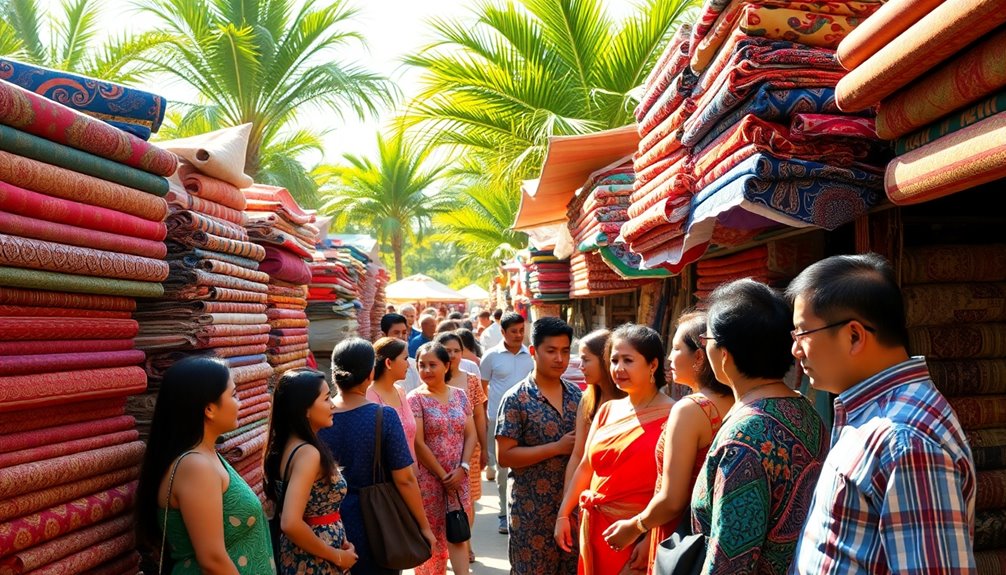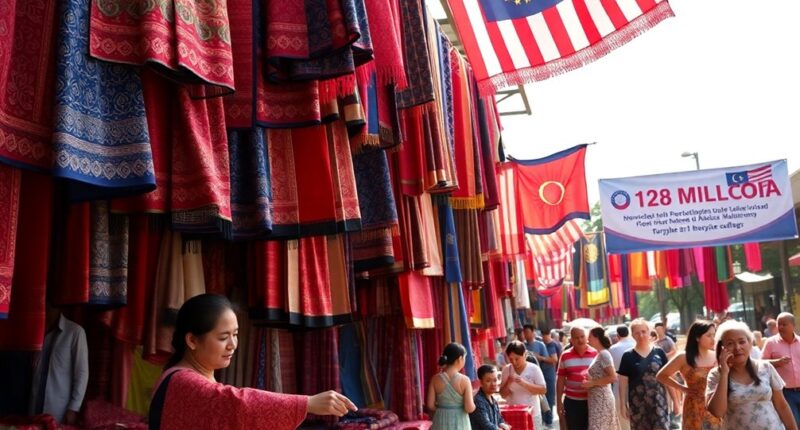Türkiye has recorded a remarkable 20% increase in fabric imports from Malaysia in 2024, reaching an impressive $128 million. This surge reflects a strengthening partnership in the textile trade between the two nations. Malaysia's reliable fabric supply is vital as Türkiye navigates economic challenges. With this strategic shift, both countries are poised to benefit from emerging opportunities. Discover how this growing relationship could shape the future of textile trade and what it means for both economies.
Key Takeaways
- Türkiye's fabric imports from Malaysia increased by 20% in 2024, highlighting a strengthening trade relationship.
- The milestone of $128 million in imports reflects growing demand for Malaysian textiles in Türkiye.
- In 2023, Türkiye imported knitted or crocheted fabrics from Malaysia valued at $351,090, indicating diversification in fabric sources.
- Türkiye, as the second-largest textile supplier to the EU, benefits from expanding its import partnerships with Malaysia.
- Malaysia's strategic positioning as a reliable textile supplier aligns with Türkiye's need for diverse fabric sources amid global market challenges.

As Malaysia navigates the complex landscape of global textile trade, it has imported a staggering 69,695 fabric shipments from March 2023 to February 2024. This influx highlights Malaysia's crucial role as a significant player in the textile market, ranking 59th globally in terms of shipment count.
Interestingly, while Malaysia's overall fabric imports have shown a decline recently, there's a noteworthy trend emerging with Türkiye. In 2024, Türkiye recorded a 20% uptick in its fabric imports from Malaysia, reaching a remarkable milestone of $128 million.
A notable shift is occurring as Türkiye's fabric imports from Malaysia surged by 20% in 2024, hitting $128 million.
You might find it fascinating that Türkiye is the second-largest textile supplier to the EU, showcasing its importance in the global textile landscape. As Malaysia imports primarily from countries like India, Vietnam, and Indonesia, the growing relationship with Türkiye signifies a strategic shift. Notably, Malaysia imported 69,695 shipments of fabric during this period, emphasizing its active role in the global market.
The knitted or crocheted fabrics imported from Türkiye, valued at $351,090 in 2023, illustrate the burgeoning trade dynamics between these two countries.
Despite facing challenges such as high costs and the impact of a global recession, Türkiye's projected economic growth of 3% by 2025 opens up opportunities for Malaysia's textile exports. By exploring expanded trade agreements, such as those with the UK, Türkiye aims to strengthen its economic ties while enhancing its textile trade.
Malaysia can capitalize on this by positioning itself as a reliable supplier of diverse textile products.
You should keep an eye on the evolving fabric import trends. As the global market shifts, both Malaysia and Türkiye can benefit from strategic partnerships.
Malaysia's imports from Türkiye not only contribute to its fabric supply but also help diversify its textile sources amid declining trends in other regions. As the textile industry continues to adapt, Malaysia's proactive response to these changes will be vital for maintaining its competitive edge in the global market.
Frequently Asked Questions
What Types of Fabrics Are Most Imported From Malaysia to Turkiye?
When you look at the fabric imports from Malaysia, you're likely to find a variety of types.
Polyurethane (PU) fabric stands out for its versatility in numerous applications. Coated cable is essential for industrial textiles, while the top coat enhances both protection and aesthetics.
You'll also see polyurethane laminate for waterproofing, and dipped polyester fabric known for its durability.
These fabrics cater to diverse market needs, making them popular choices for importers in Turkiye.
How Does This Increase Impact Local Turkish Fabric Manufacturers?
How will your local fabric manufacturers cope with increased competition? This surge in imports from Malaysia can squeeze their profit margins and reduce market share.
You might see local producers scrambling to innovate or enhance quality to stay relevant. With potential price pressures, supply chain adjustments, and changing domestic demand, it's crucial for these manufacturers to adapt quickly.
Otherwise, they risk losing ground to more competitive, imported options.
What Are the Main Reasons for the Rise in Imports?
The main reasons for the rise in fabric imports from Malaysia include competitive pricing and high-quality offerings that meet your market demands.
You might also find that lower production costs in Turkiye push you to seek imports.
Additionally, improved logistics and faster delivery times make Malaysian fabrics more appealing.
Seasonal trends and changing consumer preferences further drive your interest in diverse fabric options, ultimately influencing your purchasing decisions.
How Do Tariffs Affect Fabric Trade Between Turkiye and Malaysia?
Tariffs play a crucial role in shaping the fabric trade between Turkiye and Malaysia.
By eliminating additional customs duties under the MTFTA, you enhance the competitiveness of Malaysian textiles in the Turkish market.
With reduced tariffs on various products, you can expect increased trade volume and market share for Malaysian fabrics.
This preferential access encourages you to import more, benefiting both economies and fostering a stronger trading relationship.
What Future Trends Are Expected in the Fabric Import Market?
You can expect several future trends in the fabric import market.
As sustainability becomes crucial, demand for eco-friendly materials will rise.
Digital technologies will enhance efficiency, pushing innovation in textile production.
Regional trade agreements will likely grow, promoting collaboration among countries.
However, be mindful of potential trade tensions and inflation, which could impact costs.
Adapting to these trends will be essential for staying competitive in the evolving fabric landscape.
Conclusion
You might think that a 20% increase in fabric imports from Malaysia is just a blip on the radar, but it's a clear sign of Turkey's growing demand for quality textiles. Reaching $128 million in imports not only highlights the strength of trade relations but also opens new opportunities for manufacturers and retailers alike. Embracing this trend can lead to innovative designs and competitive advantages in the market. Don't miss out on the potential this growth brings!









